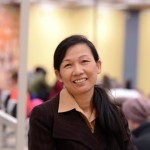Introducing Cultural Heritage Informatics into the Curriculum of LIS Education
The meanings of ‘cultural heritage’ and ‘heritage practices’ have changed considerably in recent decades. “[H]eritage is today about far more than museum artifacts and historic buildings, and how they are to be preserved and communicated. It is about making sense of our memories and developing a sense of identity through shared and repeated interactions with the tangible remains and lived traces of a common past.”[1] The heritage practice focuses not just on the protection of the heritage, but more on the management of change: the use of heritage in a broader cultural, political, and social context to express and perform constantly evolving values, beliefs, knowledge, and tradition.
Initiatives in digital humanities have demonstrated a paradigm shift in how cultural heritage materials can be searched, mined, displayed, taught, and analyzed utilizing digital technologies. These directly impact memory institutions and information professionals, who must master these new ways of interacting with cultural heritage and discover how best to serve ever-changing user populations that have far more knowledge of using, researching, and sharing information than ever before.
Cultural heritage informatics (CHI) stands at the intersection of access, preservation, and advocacy. It refers to the creative application of information, communication, and computing technology (broadly defined) to address the needs, challenges, and content of (and in) the domain of cultural heritage.[2] CHI brings a comprehensive, cross-disciplinary approach to supporting the entire lifecycle of cultural information and documentation procedures for the benefit of the preservation, study, and promotion of cultural heritage while preparing students for careers focusing on or transcending libraries, archives, museums, and other memory institutions.
We would like to think of this webinar as a starting point for discussions in an area that many of the curriculums are considering and an area that needs further collective exploration.
This webinar is presented by ASIS&T SIG ED, the premier special interest group for information science education. SIG ED has produced a variety of ASIS&T webinars promoting information science education, including a series on blended learn
Presenters
 Marcia Lei Zeng
Marcia Lei Zeng
Marcia Lei Zeng is Professor in the School of Library and Information Science, Kent State University. She holds a Ph.D. from the School of Information Sciences at University of Pittsburgh (USA) and an M.A. from Wuhan University (China). Her major research interests include knowledge organization structures and systems (KOS), Linked Data, metadata and markup languages, database quality control, multilingual and multicultural information processing, and digital humanities. Her scholarly publications consist of more than 80 papers and five books, as well as more than 200 national and international conference presentations and invited lectures and speeches. Her research projects have received funding from the National Science Foundation (NSF), Institute of Museum and Library Services (IMLS), OCLC, and Ohio Board of Regions (OBR). She is currently the P.I. of a KSU Postdoctoral Seed Program project for digital humanities research using smart data and big data. She currently teaches students of library and information science, information architecture and knowledge management, and data science at Kent State University. Her current courses are: Knowledge Organization Structures, Systems, and Services (KOS), Metadata Architectures and Applications, and Introduction to Cultural Heritage Informatics.
 Karen F. Gracy
Karen F. Gracy
Karen F. Gracy is Associate Professor in the School of Library and Information Science of Kent State University. She possesses an MLIS and PhD in Library and Information Science from the University of California, Los Angeles and an MA in critical studies of Film and Television from UCLA. Recent publications have appeared in JASIST, Archival Science, American Archivist, Journal of Library Metadata, and Information and Culture.
Dr. Gracy's scholarly interests are found within the domain of cultural heritage stewardship, which encompasses a broad range of activities such as preservation and conservation processes and practices, digital curation activities that consider the roles of heritage professionals and users in the lifecycle of objects and records, as well as knowledge representation activities such as definitions of knowledge domains, development of standards for description, and application of new technologies to improve access to cultural heritage objects. She teaches in the areas of preservation and archiving, with a focus on moving image archives and digital preservation issues.
